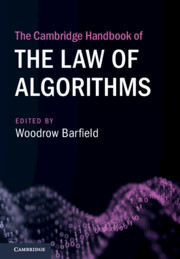Book contents
- The Cambridge Handbook of the Law of Algorithms
- The Cambridge Handbook of the Law of Algorithms
- Copyright page
- Contents
- Figures
- Tables
- Notes on Contributors
- Foreword
- Preface
- Acknowledgements
- Abbreviations
- Part I Introduction and Setting the Stage for a Law of Algorithms
- Part II Business, Regulations, and Decision-Making with Algorithms
- 6 Algorithms and Contract Law
- 7 Algorithms, Agreements, and Agency
- 8 Algorithmic Governance and Administrative Law
- 9 Discrimination in the Age of Algorithms
- 10 Algorithmic Competition, Collusion, and Price Discrimination
- 11 The Rule of Law and Algorithmic Governance
- 12 Governance of Algorithms
- 13 From Rule of Law to Statute Drafting
- 14 Algorithmic Decision Systems
- 15 From Legal Sources to Programming Code
- Part III Intellectual Property and Algorithms
- Part IV Criminal Law, Tort Issues, and Algorithms
- Part V Constitutional Law, Human Rights, and Algorithms
- Part VI Applications and Future Directions of Law and Algorithms
- Index
14 - Algorithmic Decision Systems
Automation and Machine Learning in the Public Administration
from Part II - Business, Regulations, and Decision-Making with Algorithms
Published online by Cambridge University Press: 19 October 2020
- The Cambridge Handbook of the Law of Algorithms
- The Cambridge Handbook of the Law of Algorithms
- Copyright page
- Contents
- Figures
- Tables
- Notes on Contributors
- Foreword
- Preface
- Acknowledgements
- Abbreviations
- Part I Introduction and Setting the Stage for a Law of Algorithms
- Part II Business, Regulations, and Decision-Making with Algorithms
- 6 Algorithms and Contract Law
- 7 Algorithms, Agreements, and Agency
- 8 Algorithmic Governance and Administrative Law
- 9 Discrimination in the Age of Algorithms
- 10 Algorithmic Competition, Collusion, and Price Discrimination
- 11 The Rule of Law and Algorithmic Governance
- 12 Governance of Algorithms
- 13 From Rule of Law to Statute Drafting
- 14 Algorithmic Decision Systems
- 15 From Legal Sources to Programming Code
- Part III Intellectual Property and Algorithms
- Part IV Criminal Law, Tort Issues, and Algorithms
- Part V Constitutional Law, Human Rights, and Algorithms
- Part VI Applications and Future Directions of Law and Algorithms
- Index
Summary
Our society in the twenty-first century is being shaped evermore by sets of instructions running at data centers spread around the world, commonly known as “algorithms.” Although algorithms are not a recent invention, they have become widely used to support decision systems, arguably triggering the emergence of an algorithmic society.1 These algorithmic decision systems (ADS) are deployed for purposes as disparate as pricing in online marketplaces,2 flying planes,3 generating credit scores,4 and predicting demand for electricity.5 Advanced ADS are characterized by two key features. First, they rely on the analysis of large amounts of data to make predictive inferences, such as the likelihood of a default for a potential borrower or an increase in demand for electricity consumption. Second, they automate in whole or in part the execution of decisions, such as refusing a loan to a high-risk borrower or increasing energy prices during peak hours, respectively. ADS may also refer to less advanced systems implementing only one of these features. Although ADS generally have proven to be beneficial in improving the efficiency of making decisions, the underlying algorithms remain controversial, among other issues, because they are susceptible to discrimination, bias, and a loss of privacy – with the potential to even be used to manipulate the democratic processes and structures underpinning our society6 – alongside lacking effective means of control and accountability.
Keywords
- Type
- Chapter
- Information
- The Cambridge Handbook of the Law of Algorithms , pp. 273 - 300Publisher: Cambridge University PressPrint publication year: 2020



